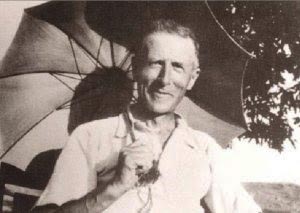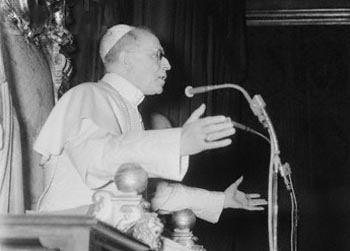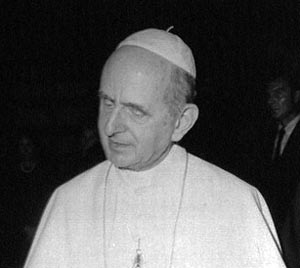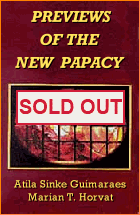Faith under Attack
 |
 |
 |
 |
 |
 |
 |
Popes for Evolution - I
From Pius XII to Paul VI
A recent article posted on TIA website presented the traditional Church teaching on original sin and showed the seriousness of the progressivist denial of the Genesis account. It also pointed to the progressivist eagerness to adapt to Evolutionism as the central tendency behind this denial. If one accepts universal evolution, one must reject the Catholic teaching on creation, God, evil, original sin, the Cross, and the Redemption.
Teilhard de Chardin
The Jesuit who gave a new momentum to the theory of evolution in the Church was the pantheist philosopher and fraudulent paleontologist Fr. Pierre Teilhard de Chardin. Chardin considered his evolutionary ideas to be much more than a theory or a system: “It is a general condition to which all theories, all hypotheses, all systems must bow, and which they must satisfy henceforward if they are to be thinkable and true. Evolution is a light illuminating all facts.” (1)
 In another work, he clearly states the consequences of the evolution he proposes: “Creation, spirit, evil, God – and more specifically, original sin, the Cross, the Resurrection, the Paroussia, charity – all these notions once they are transposed to a ‘genesis’ dimension become amazingly clear and coherent.”(2) By genesis he meant evolution.
In another work, he clearly states the consequences of the evolution he proposes: “Creation, spirit, evil, God – and more specifically, original sin, the Cross, the Resurrection, the Paroussia, charity – all these notions once they are transposed to a ‘genesis’ dimension become amazingly clear and coherent.”(2) By genesis he meant evolution.
Before Vatican II, the works of Teilhard de Chardin that promoted evolution and opposed original sin were forbidden by the Superior of the Jesuits (1925); Rome also forbade him to write or teach on philosophical subjects; his works were banned from Catholic libraries or prevented from being translated to other languages (1957). His books and papers were nonetheless circulated privately among the progressivist theologians and scholars. In 1962, the Holy Office still issued a strong condemnation of the controversial theologian. (3)
Nonetheless, his influence was noticeable during the Council. Card. Joseph Ratzinger, for example, sustains that the Vatican II pastoral Constitution Gaudium et spes was largely influenced by the opinions of Teilhard de Chardin. (4)
In the wake of Vatican II, Chardin’s evolutionary theories began to be openly taught and defended, even though that condemnation was never officially lifted. In fact, Card. Agostino Casaroli, the Vatican Secretary of State, in 1981 sent a letter, on behalf of John Paul II, to the Rector of the Institut Catholique de Paris praising Fr. Teilhard de Chardin. This letter became famous as his "rehabilitation". (5)
One year later, Card. Joseph Ratzinger also praised Teilhard for “including the historical movement of Christianity within the cosmic process of evolution” in his work, The Principles of Catholic Theology. (6)
This rehabilitation became almost complete with the praise in 2009 by Pope Benedict XVI, who held up Chardin as a model priest, stating, "It's the great vision that later Teilhard de Chardin also had: At the end we will have a true cosmic liturgy, where the cosmos becomes a living host … Let us pray to the Lord that he help us be priests in this sense ... to help in the transformation of the world in adoration of God, beginning with ourselves." (7)
Pius XII opens doors to evolution
Outstanding among Pope Pacelli's encyclicals was Humani Generis written in 1950, which dealt with the origin of man. It was generically meant to censure the Nouvelle Théologie and its theories, and, for this reason, in it the Pontiff reaffirmed the infallible nature of the truth contained in the first chapters of Genesis. (8)
 But, specifically, parts of that Encyclical did open doors to some limited discussion of evolution. First, Pius XII suggests that further study on the topic was necessary and could prove evolution correct. In fact, this is exactly what John Paul II stated when he referred to it in October 1996: “Humani Generis considered evolution to be a serious hypothesis worthy of more deeply studied investigation.” (9)
But, specifically, parts of that Encyclical did open doors to some limited discussion of evolution. First, Pius XII suggests that further study on the topic was necessary and could prove evolution correct. In fact, this is exactly what John Paul II stated when he referred to it in October 1996: “Humani Generis considered evolution to be a serious hypothesis worthy of more deeply studied investigation.” (9)
Second, Pius XII stated that nothing in Catholic doctrine is contradicted by a theory that suggests one species might evolve into another, even if that species is man. (10) This statement of Pius XII initiated the escalation of the acceptance of evolution in the Church.
Paul VI
In his Memoires, Henri de Lubac noted that Paul VI had expressed a favorable opinion of Teilhard de Chardin, an opinion he shared in a speech before an assembly of theologians at the Roman Pontifical Academy of St. Thomas Aquinas in June 1963. (11)
 Paul VI was more blatant in his admiration of Chardin’s theory in a speech in 1966 to employers and workers of an important pharmacy company. In it, he praised the core of Chardin’s theory of the evolution of the universe and pointed to it as a model for science. Even though Paul VI made some restrictions in his praise, it was a strong endorsement of Teilhard's unorthodox theses. (12)
Paul VI was more blatant in his admiration of Chardin’s theory in a speech in 1966 to employers and workers of an important pharmacy company. In it, he praised the core of Chardin’s theory of the evolution of the universe and pointed to it as a model for science. Even though Paul VI made some restrictions in his praise, it was a strong endorsement of Teilhard's unorthodox theses. (12)
We see, therefore, that the censures against the evolutionary theories were not enough to halt its dissemination. Pius XII opened doors to them, the Council accepted them and incorporated them in one of its principal documents, and Paul VI started a public consecration of Fr. Teilhard de Chardin. What had been condemned for most just reasons and for the preservation of the Catholic Faith, became accepted without correcting any of its previous errors.
The tragic thing is that the Popes following Paul VI continued on the same path, praising the pantheist theologian and promoting evolutionism. This is what we will analyze in the next article.

Posted June 22, 2012
Teilhard de Chardin
The Jesuit who gave a new momentum to the theory of evolution in the Church was the pantheist philosopher and fraudulent paleontologist Fr. Pierre Teilhard de Chardin. Chardin considered his evolutionary ideas to be much more than a theory or a system: “It is a general condition to which all theories, all hypotheses, all systems must bow, and which they must satisfy henceforward if they are to be thinkable and true. Evolution is a light illuminating all facts.” (1)

1920s - Chardin in China seeking the needed "missing link" to support the evolutionary theory
Before Vatican II, the works of Teilhard de Chardin that promoted evolution and opposed original sin were forbidden by the Superior of the Jesuits (1925); Rome also forbade him to write or teach on philosophical subjects; his works were banned from Catholic libraries or prevented from being translated to other languages (1957). His books and papers were nonetheless circulated privately among the progressivist theologians and scholars. In 1962, the Holy Office still issued a strong condemnation of the controversial theologian. (3)
Nonetheless, his influence was noticeable during the Council. Card. Joseph Ratzinger, for example, sustains that the Vatican II pastoral Constitution Gaudium et spes was largely influenced by the opinions of Teilhard de Chardin. (4)
In the wake of Vatican II, Chardin’s evolutionary theories began to be openly taught and defended, even though that condemnation was never officially lifted. In fact, Card. Agostino Casaroli, the Vatican Secretary of State, in 1981 sent a letter, on behalf of John Paul II, to the Rector of the Institut Catholique de Paris praising Fr. Teilhard de Chardin. This letter became famous as his "rehabilitation". (5)
One year later, Card. Joseph Ratzinger also praised Teilhard for “including the historical movement of Christianity within the cosmic process of evolution” in his work, The Principles of Catholic Theology. (6)
This rehabilitation became almost complete with the praise in 2009 by Pope Benedict XVI, who held up Chardin as a model priest, stating, "It's the great vision that later Teilhard de Chardin also had: At the end we will have a true cosmic liturgy, where the cosmos becomes a living host … Let us pray to the Lord that he help us be priests in this sense ... to help in the transformation of the world in adoration of God, beginning with ourselves." (7)
Pius XII opens doors to evolution
Outstanding among Pope Pacelli's encyclicals was Humani Generis written in 1950, which dealt with the origin of man. It was generically meant to censure the Nouvelle Théologie and its theories, and, for this reason, in it the Pontiff reaffirmed the infallible nature of the truth contained in the first chapters of Genesis. (8)

Pius XII opened doors to evolution
Second, Pius XII stated that nothing in Catholic doctrine is contradicted by a theory that suggests one species might evolve into another, even if that species is man. (10) This statement of Pius XII initiated the escalation of the acceptance of evolution in the Church.
Paul VI
In his Memoires, Henri de Lubac noted that Paul VI had expressed a favorable opinion of Teilhard de Chardin, an opinion he shared in a speech before an assembly of theologians at the Roman Pontifical Academy of St. Thomas Aquinas in June 1963. (11)

Paul VI praised Chardin's theory of evolution
We see, therefore, that the censures against the evolutionary theories were not enough to halt its dissemination. Pius XII opened doors to them, the Council accepted them and incorporated them in one of its principal documents, and Paul VI started a public consecration of Fr. Teilhard de Chardin. What had been condemned for most just reasons and for the preservation of the Catholic Faith, became accepted without correcting any of its previous errors.
The tragic thing is that the Popes following Paul VI continued on the same path, praising the pantheist theologian and promoting evolutionism. This is what we will analyze in the next article.
- The Phenomenon of Man, 1940, p. 219;
- Theodosius Dobzhansky, “Teilhard de Chardin and the Orientation of Evolution: Critical Essay,” Zygon: Journal of Religion and Science, 3, September 1968;
- L'Osservatore Romano, July 1, 1962, p.1;
- Les Principes de la Theologie Catholique - Esquisse et Materiaux, Paris: Tequi, 1982, pp. 374-375;
- “Card. Casaroli praises Teilhard de Chardin on behalf of John Paul II,” L’Osservatore Romano, June 10, 1981;
- Les Principes de la Theologie Catholique - Esquisse et Materiaux, Paris: Tequi, 1982, pp. 374-375;
- “Benedict XVI Praises the Cosmic Liturgy of Teilhard de Chardin,” L’Osservatore Romano, July 29, 2009;
- Atila Guimaraes, Animus Imjuriandi II, Chap IV.3, p. 214, note 42;
- Address of John Paul II to the Pontifical Academy of Sciences (October 22, 1996);
- “The Teaching Authority of the Church does not forbid that, in conformity with the present state of human sciences and sacred theology, research and discussions, on the part of men experiences in both fields, take place with regard to the doctrine of evolution, in as far as it inquires into the origin of the human body as coming from pre-existent and living matter - for the Catholic faith obliges us to hold that souls are immediately created by God. “ (Humani Generis, 1950);
- “They Think They’ve Won!,” Si si no no, April 1994, n. 7;
- Paul VI, Speech to Employers and Workers of a Pharmacy Company, February 24, 1966, in Insegnamenti di Paolo VI, Poliglotta Vaticana, 1966, pp. 992-93).

Posted June 22, 2012











